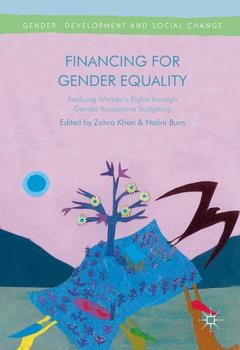Description
Financing for Gender Equality, 1st ed. 2017
Realising Women’s Rights through Gender Responsive Budgeting
Gender, Development and Social Change Series
Coordinators: Khan Zohra, Burn Nalini
Language: English
Subjects for Financing for Gender Equality:
Publication date: 02-2020
333 p. · 14.8x21 cm · Paperback
Publication date: 03-2017
Support: Print on demand
Description
/li>Contents
/li>Biography
/li>Comment
/li>
Zohra Khan is Policy Advisor to the United Nations Entity for Gender Equality and the Empowerment of Women, New York, USA. She has over 15 years’ experience in international and non-governmental organizations providing policy advice and technical assistance on gender responsive planning and budgeting.
Nalini Burn is an independent researcher, who has worked for over 20 years as a hands-on practitioner of gender-responsive policy planning and budgeting in a wide number of countries. She has held academic posts at the University of Mauritius, and the University of Brighton, Sussex, UK.




